
Momento Mori, southern Germany, 17th century.
“But, ah, thought kills me that I am not thought.”
Shakespeare, Sonnet 44
“The continuity of the ego is a myth.”
Brecht
“I have done it, says my memory. I cannot have done it, says my pride and remains inexorable. Finally, the memory gives way.”
Nietszche
“…the facts are there but time will tell I resume alas alas on on in short in fine on on abode of stones who can doubt it I resume but not so fast I resume the skull fading fading fading and concurrently simultaneously what is more for reasons unknown in spite of the tennis on on the beard the flames the tears the stones so blue so calm alas alas on on the skull the skull the skull the skull…”
Lucky, from Waiting for Godot
Beckett
The question of theatre and audience arose this week with the death of Edward Albee. Albee is likely to be grow in stature as time goes on. But I think not in quite the way he is being praised now — for his work is very outside the mainstream for American theatre today. But the idea of audience is important to address because I continue to feel that it has changed. And not just for theatre, but for all of the arts. This immediately raises questions of class. The limit of bourgeois culture was probably reached a decade ago. And I mean the absolute limit. Or I think that’s what I mean. And the role of film, and TV, and all screen entertainments (and even social media) are related in this change in the audience.

Lorena Herrera Rashid
The *theatricalizing* of daily life is an increasingly popular topic in University programs. And it is so for a reason. Mass entertainment is now reproduced so rapidly, and across so many formats that it is, on one level, robbing the ritual space of theatre of some of its specificity. Herbert Blau once wrote that theatre’s power was in its thought — a thought that cannot exist without theatre. Montaigne said death was a scene with only one actor. Which Blau added to by suggesting it was an unseeable scene. And I thought this week how all writing is, in a sense, a suicide note. But then I read Blau again, this week, who suggested that death itself was dying. Blau had already asked ‘what of’ the audience today. He said what is at stake..“is the nature and status of the spectator in a globalized, migratory, mediatized world.”
The bourgeois theatre is, today, more suffocating and banal then at any time in memory. And I doubt those practioners of said theatre would even argue this. They like it that way. In the same the U.S. state department and Pentagon like failed states just as they are.
“Who’s there?” As I’ve written before, those opening words of
Hamlet (1.1.1)—the wrong character making the challenge, not the one
on guard, but the one approaching the ramparts—might very well be
addressed to those sitting there in the dark.”
Herbert Blau

Hole dug on Mars, Curiosity rover.
All participatory experiments in theatre fail. And they fail because the audience is already participating. And those who are excluded from what the educated classes think of when speaking of *theatre* are excluded even if brought to the theatre (as Sontag and Peter Sellers have done). For such experiments forget the nature of the audience. And in the advanced Capitalist West, the bourgeois audience sees ever less, hears ever less. Not just what they tacitly ignore on stage, but in daily life. The play within a play, in Hamlet, a favorite of Blau’s, is also (along with The Tempest, perhaps) to theatre what Las Meninas is to painting. It is ur-doubling. And it is also an early redefining of bourgeois perception.
I will return to that, but sticking with these questions from the perspective of the audience for a moment; many (Badiou for one) have written of *chance* in art and theatre and chance as it is embodied in the audience. And this is, I think, wrong. The audience is neither generic (per Badiou) nor is it part of the ‘play’ or ‘performance’. It is part of the ritual, but not the performance. There are audience members who will fall asleep (as one LA Times reviewer used to do regularly) but that doesn’t really matter. If doesn’t matter, I don’t think, if everyone in the audience is asleep. For in America today I might argue that is close to true. No, the play, the performance of memorized text, occurs regardless. And even the barest implied gathering of group attention is reproducing an effect that is connected to all gatherings and crowds and perhaps even societies. For the audience is partly the metaphor for society.
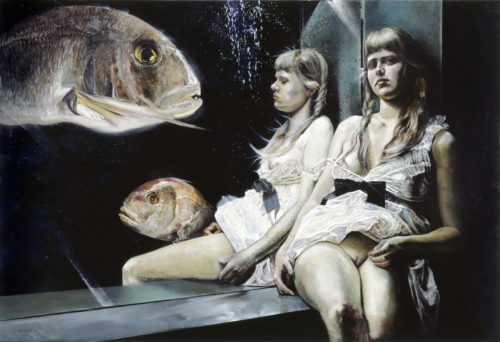
Neo Rauch
When groups, but atomized as *individuals* visit museums or even aquariums or the Natural History Museums of various cities, they are acting as an audience, too. But they are also visiting the curious history of their own psychic development. And this is implied, really, with all mimetic acts. But that thrust of participatory 60s anti theatre, even at its best, reached a dead end. Not everyone desires or should have the burden of performance. The system, naturally, encourages a kind of fake theatricality and performative activity for the consumer public — for that distracts from other things like political organizing. But it is even more than that. It is seamless path to cognitive nullity. And this is maybe even something Beller implied, indirectly, with this vaguely post humanness idea. For the problem with this *thought* that exists on stage, as theatre-thought, is that it is radically autonomous. It is indivisible and, in one sense, impervious to the audience. In another sense of course it *is* the audience. It exists only at the behest or, by virtue of the largesse of the audience. It is a kind of *thought* rooted in relations of social power. Which is not to say it is inherently hierarchical, for I suspect it is quite the opposite of that. But the memory traces called forth in any, even the most fleeting, group attention, are somehow a part of the lost barely legible memories.
One of the assumptions behind much post modern thinking is how the human is reaching post humanness and how everyone, through digital appropriation, becoming dematerialized. And yet I think this possibly exactly wrong. I think the idea of *realism*, in narratives, in screen representations, and that is mostly what everyone spends most of their time doing — watching screens (in the affluent West anyway) — has little changed how the ideas of narrative operate. But what has changed is the way audiences are now more often a step removed from those at the aquarium or natural history museum. When Blau points out the plaza at the Pompidou Center, with acrobats and tourists and what not — that this is a kind of performance space more than architectural, he quickly adds that it fails as such…. “If that’s not so much architecture but a performative space, it’s one in which, however, the old dream of symbolic exchange, beyond use value, is not realized, for that implies, as Baudrillard remarked in an early essay, “a sacrificial logic of consumption”.”

Diego Velazquez (Mars Resting). 1638.
The missing audience seems unreclaimable – that audience one used to think of when the word was used. THAT audience is gone. Dead. It will not and cannot return. And what one sees today, on Broadway or in mid size houses throughout the West, is a funeral rite, and perhaps not quite that. It is a kitsch ceremony of denial of mourning. It is a kind of cargo cult activity, an official validation of the non-living, a certificate being issued to say your family is not missing but we just can’t find them. Buy the ticket, and this is even true at Multiplex movie houses (all of which are architecturally close to strip mall kiosks or auto repair shops) where non life is the currency and staying awake is the goal.
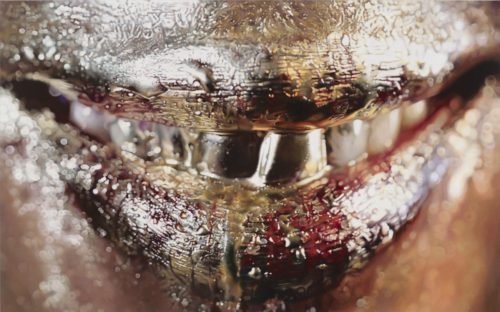
Marilyn Minter, photography.
“The rhythms of technological consumption are inseparable from the requirement of continual self-administration.”
Jonathan Crary
I wrote last posting that realism is perceived and meant to seem *neutral*, or vice versa. And in the same way one is meant to believe that somehow individuals can exist with this vast apparatus of self regulation. Except there is no self in this context. This is one of the problems with the TV series Mr.Robot. It posits individuality versus the system. But individuality is now only a marketing term. And the apparatus restricts activity to various keystrokes. If one extrapolates that outward it is not hard to see the self regulatory in audiences performing the role of audience. Performing ‘attentiveness’ while watching the ‘play’. And this reminds me a bit of Beckett, for the language of Beckett’s plays is the language of the contemporary fugue state or dissociative identity disorder, and perhaps that is what his plays point toward. Not the generalized autism of Debord, but a step past that. A kind of amnesia but with a performative aspect. How does one perform amnesia? What are the physical gestures of forgetting? What is the grammar of the dissociative?
“The Que chua Indians believe that the soul (or perhaps part of it) can leave
the body, either spontaneously or through being forced. The Susto disease can
occur in two ways: either through fright caused, for instance, by thunder, the
sight of a bull, a snake, and so on, or because of malevolent influences, not following
upon fright (the latter being called “Susto without Susto”). Among the
malevolent forces that can produce the abduction of the soul, the influence
of the earth is considered supreme. The Quechuas show a great fear of certain
slopes and caves, and especially of the old Incan ruins. Whether the Susto
occurs following a fright or not, in both cases the power to be propitiated is the earth.”
Dr. Federico Sal y Rosas

Valerie Belin, photography.
Caves and grottos and the spaces of Nature. Wherein resides metaphor. On a certain level the unconscious of the Que chua tribe is closer to Shakespeare than to Mr. Robot. The screen represents grottos and caves, but diffuses these images in a way that dilutes them. This is almost a cliche, of course, for it more complicated than that. Adorno wrote that the audience had been degraded to almost a fiction. And that the language of the audience had not kept up. The *I* cannot say anything of what was watched without recourse to *we*. It is good to remember when discussions take place about the audience and performer, the *we* and the *I*, that all of this is transitory. The performer is not a performer when not performing.
Lee Breuer wrote of actors….“The audience observes a conversation between the actor and a point in front of them. It is not direct address in the Brechtian sense. It is rhetorical since it is spoken to the ideal abstract listener. The audience can observe this rhetoric for what it is . . . The play is making up the audience precisely at the time the audience is making up the play.”

Brett Bigbee
This is sort of right, but sort of not. It is not the ideal abstract listener who is being addressed. Nobody, really, is being addressed. For this is not a conversation or a conventional speech or lecture. It is a ritual memorizing of text (in part). The audience knows this, just as it knows this is not a window opened to real life. It is artifice. So the rhetoric of the spoken dialogue is a part of the learned rules of the ritual. And this is important to know. When agit-prop performances take place on city streets on in hotel lobbies or wherever, the stage is very much implied. And the memory of the actual stage of a theatre is evoked. But it cannot sustain the evocation for very long and that is the problem with such events.
“The experimental approach to the study of the unconscious was introduced by Fechner with his psychophysics. In order to check his metaphysical hypothesis about the relationship of mind and body, about 1850 he began a long series of experiments on the mathematical relationship of the intensity of stimulations and the intensity of perceptions. While computingthe intensity of perceptions, he gave negative values to those below the threshold of perception. However, he found that the difference between the waking state and the sleeping state was not mainly a difference in the intensity of a certain mental function. It was as if the same mental activities were displayed alternately on different theater scenes or stages (a remark that was to be the starting point of Freud’s topographical concept of the mind).”
Henri F. Ellenberger
Theatre is the most singular of mediums in art. And putting aside how to define art, the issue is really that all art is theatre in a sense. And it is Herbert Blau who, more than any other modern writer on theatre, best uncovers and describes what happens on stage and in a theatre. Maria Minich Brewer wrote a nice short essay on Blau’s theatre writings:
“Blau asserts that the unconscious and
theater share the same ontological and phenomenological space. “Wherever the
unconscious is, it is in a scene of theater”. In a yet more specific formulation,
Blau situates the “appearance of theater, through fracture, in the birth of the
psyche itself”.”
Mária Minich Brewer

Wilhelm Schuermann, photography (1979).
I have, of course, gone further in a sense by suggesting that it is the *off stage* that is the site of the unconscious. But this needs elaboration. Blau said the audience appears in that space between the look and the gaze. This goes back to the now exhaustively examined ‘fort/da’ game Freud writes about. Lacan saw great significance in this and the suggestion is that the child controls the story by becoming the audience. But that which looks at itself is split — and so the materializing of the audience is always a doubling. The watchers watching the watchers watching the watched. Reality is, then, something experienced from this split audience perspective. For this reproduces our own psychic splintering. And so the work of Blau and in particular Peter Brook, and playwrights such as Genet and Handke, are acutely sensitive to the Vedic notion of dreams. The dream dreams us. What Blau calls the revisionism of the unconscious provides a theatricality, but one in which, as he says..“remains out of sight”. Off stage. Actors are pointing to the meaning (for lack of another better word) that has just left the stage. When the lights come up, the play and the actors recognize that something has just left (something I wrote years ago without quite realizing the significance). That other scene, those other actors, who have disappeared are also contracting — in a kind of performative repression — and only promise to return, but in disguise. But cutting across this is the residue of repetition that haunts theatre and is built from the process of rehearsal and memorization. And this is why the text encloses the ‘theatre idea’. The repetition of text, spoken aloud, before this audience that is itself both us and not us, both me and not me — this repetition is the link to our formation and to Death.
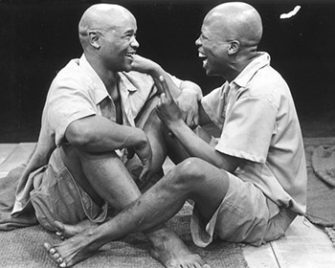
John Kani and Wilson Ntshona in Fugard’s Sizwe Bonzi is Dead.

Tadeusz Kantor, early 70s.
Philip Auslander is right about the culture of TV today. For TV more than film has created its own context; one of intimacy and personalization. You the audience controls when you watch, you are back at ‘fort/da’. Now Blau has said (I believe in relation to Beckett) that time on stage is watching someone die. And this is right in the same way that all writing is, finally, a suicide note. Which is not exactly right, because it might be more accurate to call it a written argument against death. Or perhaps for death. In that way the Broadway of Hamilton might be compared to the performances of Cricot and Kantor. Or those early Fugard plays. Or Grotowski or Augusto Boal or Heiner Muller or Handke. One obscures the dying and the argument, the other reveals it. And that revealing of time and dying is also a process of recovering memory. We are recovering our own trauma, as well as examining the social trauma that led us to this point. Now, Michel Benamou has argued that post modernism and its varietals are linked together by performance. I seem to recall his saying how everything must now perform…no more *just* having a painting hang on the wall of a museum. This sort of sophistry is rampant, today. And when Auslander dissects, seriously, Steve Martin and other stand-up comedians, the confusion is amplified. And part of the confusion revolves around the idea of *representation*. When I use the term *representation*, I really mean bourgeois representation. Tadeusz Kantor was on-stage directing, or conducting, the performances of Cricot. And with Kantor, too, the audience was included in the set. They were never, however, not the audience.
“I believe that an artwork has to be closed if it is to fascinate. A closed artwork forces the viewers to focus. They’re forced to feel like people in the shadow of a huge pyramid, which is inaccessible but has a colossal, not to say metaphysical, influence. However, this pyramid emanates certain vibes.”
Tadeusz Kantor
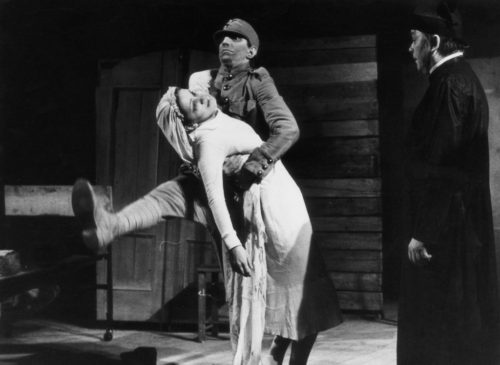
Wielpole, Wielpole. (Cricot, 1980).
There is representation and there is representation. Bourgeois representation, then, is the masking of this ritual of recovery. It is (like Las Vegas) both constantly ironic, and obsessively concerned with a certain kind of dead-alive. The constant *now* of marketing and advertising. The alive that is really dead. Or at least asleep. It is the eradicating of immanence. Kantor’s theatre, like that of Handke or Bernhard, or Muller, is the excavation of memory. The Wooster Group is, today, in business. In the business of business. There is precious little to separate them from Vegas. Wooster meets Wayne Newton. And Las Vegas is now political since Newton and most of that city are big supporters of Trump. This is the ascension of kitsch politics. If Newton is Trump, then the Wooster Group is Hillary. This is bourgeois elitism. Now this may be a bit harsh, and the Wooster Group has a long complex history, but the trajectory of that history arrives at a certain kind of technological fetishization.
The stage always has the potential, pace Blau, to be the site of deepest memory, or the deepest form of memory. And as such, the audience is implicated in history.
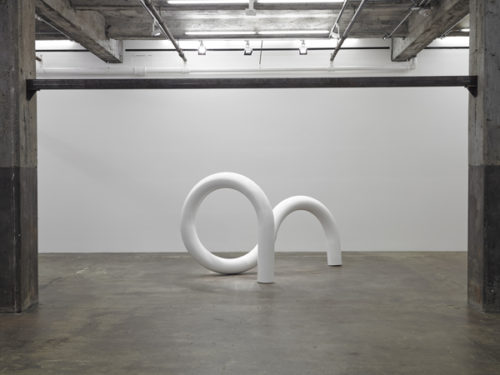
Carol Bove
“Blau places theater at the very core of the unconscious and of cultural memory,
and in reciprocal fashion he places the unconscious and cultural memory at the
core of theater. In the forgetting of theater, he states, lies the willful forgetting of
everything”
Mária Minich Brewer
That ritual of recovery has radical political implications. For the system of social domination cannot tolerate an audience that remembers.
There is another aspect of this notion of ‘liveness’ that is so often raised. And that is the documenting of live performance. For this obsessive documentation is congruent with Capital. It is a commodification of the ‘live’. The live is reproduced the better to serve as screen commodity. But forgotten, often anyway, in these discussions is the role of text. The idea of theatre, or rather the theatre idea, is inseparable from text. From memorized speech. The plays of Pinter, for example, are excavations of bourgeois sensibility in the speech that obfuscates. Pinter found a dialogue that expressed what is normally silenced. The sadistic and the suffering, the grammar of the lost in a sense, that which is off stage at the Wayne Newton performance at The Mirage. And this runs alongside the notion that live performance is ephemeral. Lost to history. The exact opposite is true, in fact. The documentation is what creates the ephemeral. And this in turn raises issues of Susan Sontag’s position in Against Interpretation. For these terms, looked at decades later, feel strangely reactionary. For Sontag, interpretation interfered with the experience of the artwork. And yet, this is oddly troubling, and I think it is troubling for me because the use of the word *interpretation* is rather loaded. It is the possession of a class of critic, or institution, and it is blind to the entire apparatus of cultural appropriation by the system. Deep down there lurks a kind of anti intellectualism, a kind of paternalistic bourgeois sensibility.

Wayne Newton, USO show.
The theatre idea, that which materializes on stage and nowhere else only appears in front of an audience. Jan Kott pointed to Mad Tom on the heath as a scene that cannot exist anywhere but on stage. Great plays are text, though. They are theatre ideas because of what is spoken. Following upon that comes image. The live part of theatre is firstly listening. The audience listens, and it listens attentively. The actors are speaking from memory. There are multiple paradoxes in the performance of the actor. Speaking from memory, but also forgetting. Forgetting everything but what has been memorized. Great performances are displays of both remembering and forgetting. This is what is missing in film and TV. Now, in film there is something else that occurs for the actor. That is the close up. The eloquence of the eyes. Film is documenting that which cannot be documented. Which is why film is more compelling than a filmed play. And the distinction is blurry, I grant you. But that’s not to change the essential truth of this. The actor in film is not memorizing anything. He is behaving, and as such he is dying. The unmistakable odor of death infects all movies. That is why we watch them. The watchers being watched dying. Perhaps. The documenting is a momento mori — remember that you have to die. In Rome, it was the slave following after the returning (!) victorious warrior who was paraded before the crowds who said….’Look after you (after your death) and remember you’re but a man’.
“Bardolph: Why, Sir John, my face does you no harm.
Falstaff: No, I’ll be sworn; I make as good use of it as many
a man doth of a Death’s-head or a memento mori: I
never see thy face but I think upon hell-fire and
Dives that lived in purple; for there he is in his
robes, burning, burning.”
Shakespeare,
Henry IV, part one.
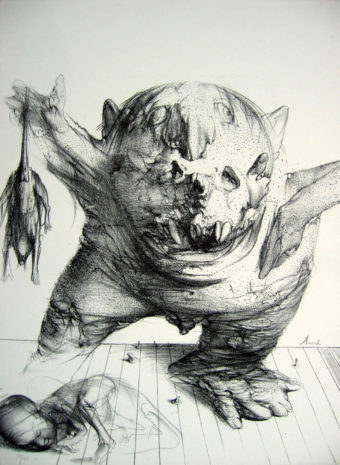
Dado
The political theatre of the U.S. this year is one of the clearest examples of the return of the repressed on a collective level that I can remember (sic). The narrative for this election is played out in bourgeois stagings. It is the Broadway play today told as politics. And Trump is the creature from the black lagoon, the return of the most overdetermined villain in US public history, probably. He is Batman’s Joker. But the surreal side of this narrative comes from the Hillary Clinton character, for it is as if the star got sick and an unprepared understudy was forced to perform. Except that’s not the case. And in a way Hillary Clinton looms as the most death like figure in public life since, I would guess since Abraham Lincoln. The fact that zombie tropes continue to surface, both as entertainment vehicles and as, now, a well established metaphor for contemporary life, is not surprising since Mrs. Clinton seems intent on presenting herself as the walking dead. But this circus has pushed the public unconscious to center stage — and never has such hysteria been unleashed in white America. More even than civil rights, Vietnam, or O.J. The liberal white class refuses to accept that others will not obey, will not fall in line and vote against Trump. For Trump is the *wrong* bad candidate. He is indecorous, and gauche. He is the kind of man wears white bucks after Labor Day, and is proud of his vulgarity. The first president to use bottled tanning cremes and sun lamps. Liberals loath him because they can’t imagine him visiting for a summer weekend at their Hampton’s beach house. The fact he is an odious racist is just a side bar issue. His manners are wrong. He is the return, in a strange way, of Andy Griffiths in Kazan’s Face in the Crowd. But enough has been written on all this, and what is more interesting, I think anyway, is the sense of bad theatre the country has arrived at.
This is the fragmented montage of a post literate culture. Politics is performed by zombies (Samantha Power is a great example) and one in which your streaming sites keep buffering. It is the sweaty upper lip election. For there is not only no story, there is no stage, and barely any actors who are alive.
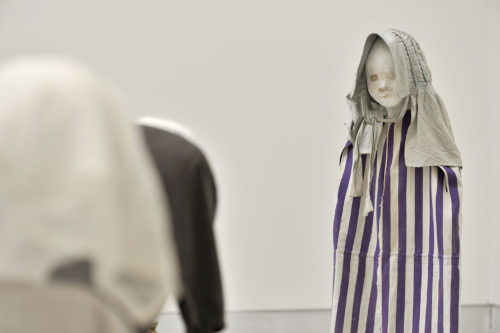
Cathy Wilkes
The eroding of history, in the audience, was a concern for Blau. And his later writing began to suggest that how history adheres (Arendt’s term) to the unconscious is worked out in theatre. But he also saw this was not directly causal. There are prisms through which these rituals are acted. And the prisms of the commodified mass culture of the West are ever denser. And I sense, from a vantage point decades later than Blau, that text is the mechanism for recuperation.
A last thought, for now, on representation. The theatre of representation is a too wide grouping. One cannot place Strindberg and Bernhard next to, well, most of the new plays listed by the N.Y.Times as best shows of 2015. Of course half are revivals, Miller and Shepard (with well known film actors) and two musicals, but among the new pieces the idea of representation feels mildly questioned, at best. Looming over all are Hamilton, and a play about the current Prince of Wales once he becomes King…called unsurprisingly King Charles III . Ive not seen nor read this piece, but it does suggest that the aristocracy as subjects and facile style equal success these days. We live in a country with 2 million people kept in cages, many of whom are mentally ill, and a grotesque percentage of which are black or latino. A culture where one in four are on prescription anti depressants. Where police violence is at all times high and lethally high. And yet the theatre, from the self anointed flagship city for theatre, serves up plays about royalty. Plays that are, at best, Im guessing, parodies of parodies of Shakespeare.
So representation is of course the default position — but such work does not even rise to the level of discussion. It really isn’t theatre. Not as I understand it. The audience must become an audience. The white bourgeoisie are drowning in their insanity. Another audience must come, and see the idea materialize before them.
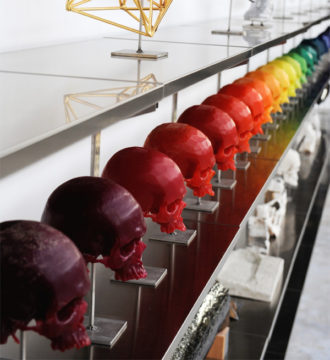
Matthew Day Jackson
When Freud came to the U.S. in the 20s….
“Max Eastman, in 1926, was taken aback by the outrageous prejudice
Freud displayed against the United States and the shockingly overt way he
expressed it before American visitors.
Andre Breton reported that “the greatest psychologist of this time lives
in a house of mediocre appearance, in a lost quarter of Vienna.” He did
not find the maid who opened the door pretty. When he finally came to
Freud’s office, Breton says, “I found myself in the presence of a small,
unassuming old man who received in his shabby office, like a physician for the poor.””
Henri F. Ellenberger
Blau said, healing always begins with revealing what is hidden.
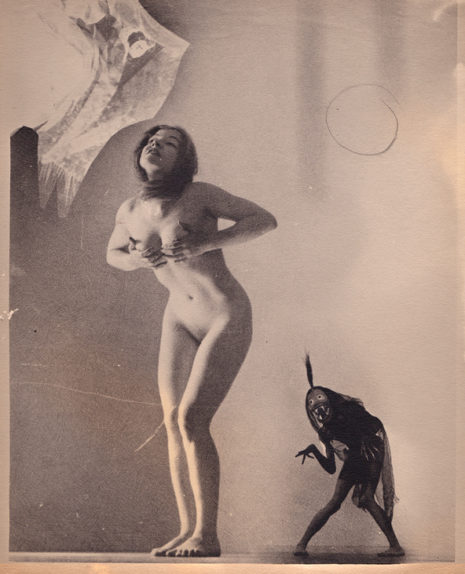
Henry Mortensen, photography.
A final note on the retirement of an American institution. Vin Scully calls his final game this week, concluding a career that spans sixty seven years. There is no reason to go over his career highlights. For that isn’t the point. Scully clearly transcended his job description. Much as Chick Hearn did in calling basketball. Scully is closer perhaps to Johnny Carson in that he helped build a part of American culture. I once had a friend whose wife used to say ‘I want to live in Vin’s world’. And so did we all. So does everyone I think. It is the refuge that Vin built. Vin won’t cheat you, or lie to you, or hustle you. He simply calls the game. And has done so since 1950. Hell, I wasn’t even born in 1950. He was 25 then, in Brooklyn. He came west with the team. And I was seven years old when the Dodgers arrived at the L.A. Memorial Coliseum. It wasn’t a baseball park (that came later with the theft of Chavez Ravine) but a football stadium, and a big one at that. People brought transistor radios with them because you couldn’t see anything from the cheap seats (my seats, my Dad’s seats). And we’d listen to Vin. There was something left coast about it all. This was how it was done in So-Cal. The point here is that nobody has done it better. Call games that is. The closest was Hearn I think. And Chick was doing something else, anyway. Vin Scully is the Johnny Carson of sports broadcasting. But with more purity. He was also a voice of comparative literacy. Unpretentious and dignified. His voice is the voice of a certain office of the unconscious. A clean tidy office we all want to go take a break in.
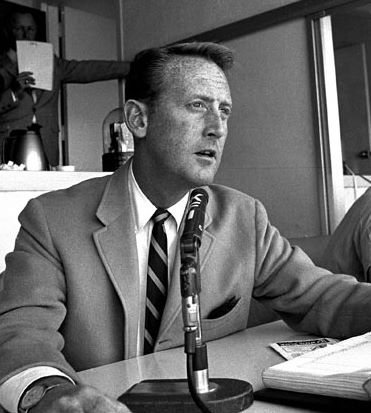
Vin

A huge kitchen sink of a piece, this one: but brilliantly mind boggling. Conjures so many thoughts and brings us to so many places that are too frequently unexamined even if we are ourselves practitioners of theater. Really. Like a fresh breeze into the dusty bins of our brains, such as they are. Only area you didn’t wander into was early rock and roll vs the conglomerate machine it became. Elvis to Janis, the Stones, Dylan and The Band. May not be accidental that you bring up Wayne Newton and Vegas – Vegas, mecca for Elvis impersonators. Vegas, that blazing light in the desert where as you come over the hill, you feel like you’re slinking toward Bethlehem alongside the beast or you have finally found Moloch if that’s what you’re looking for. Certainly a different universe from Sun Studios where Elvis first recorded. I recently saw a Viceland episode where this young nubile thing was extolling the freedom of a Vegas festival where anything goes –‘as long as nobody hurts anybody…it’s all about love’ – looked like entering ‘a funhouse show in a fish bowl’ – I think you stated somewhere once about current theatricality.
But I digress – I’m glad to hear someone else thinking that the experimental theater of the 70’s came to a dead end and ultimately was a disappointment. As I look back at Chaikin’s work, Judith Malina’s and Scheckner with The Performance Group ( basically, the original personnel of The Wooster Group) for many of us alienated young thespians they served as the way in to theater and for that I’m grateful. ( at the time, they had an extraordinary edge to the work they did. Just didn’t last and I believe the times changed. As Leonard Cohen says: the war is over and the good guys lost’. I also think that the work – was coopted by Academia so that NYU now has courses on how to do ‘performance art’ – a sham and which misses the point entirely of what the original innovators were trying for: a religiosity – the life blood of which had drained out of mainstream theater (specifically Broadway – even Miller went to England after the 70’s. where his plays were done and celebrated – but not here. ). The feeling of experimental theater hitting a wall peaked for me when I saw some young thespians doing the ‘cat’ exercise that Grotowski often used as a warm up in the middle of a piece they were doing.
What’s interesting to me is that in your playwriting the ‘other’ is so apparent – that mysterious space in the darkness where the audience sits whether it’s Prospero’s lurking demons or the spirits of the Jung’s id or ultimately the inexplicable cosmos – and so it becomes a ritual of religious significance. As a performer I experienced that and its maelstrom of psychic winds. It’s certainly more than just the narrative that’s operating on both audience and performer ( not to dismiss narrative – I see it as a platform or a frame on which to hang the characters.). Wish more people could get that and the power of the experience so that it doesn’t just end up with like-minded spirits preaching to the converted or theater artists leaving the theater in despair. Because it kind of spoils you for most other writing. If the audience has degenerated my only hope is that it can be somehow rejuvenated. Someday soon. Wish I knew how. Murray Schisgal says that the NY audience that he grew up with and who attended his plays on Broadway has disintegrated and virtually disappeared. He claims that there really was a NY audience that was sophisticated and relished thought and ‘the word’. Alas, alack.
I think you’re take on the election is a compelling one – certainly the circus feel of it or the fact that it does feel like some kind of theatrical event or ritual that the bourgeois public wants and demands for its own validation. I would only add that if it’s true that we could have someone who is of the ‘walking dead’ in the WH – is it more alarming that the power behind the throne could be unelected actors? So I dunno. It often seems to me that it doesn’t matter who is at the helm – the juggernaut moves forward toward its inevitable doom and some day I’ll have the time to get through Spengler’s Decline and Fall of the West and see how it all turns out. In any case, thanks for the extraordinary effort. Hail to you from the trenches of NY. (Not only do I frequently walk down 23rd St bec I like checking out The Chelsea Hotel to keep track of what’s being done to it but I was there on Thursday 48 hrs before the bombing so that does give one an immediate sense of the hazards of living here and that the pros and cons of conversation are not just idle chatter….. ).
glad you mentioned Chaiken, stephen. He was very important at the time and had an impact on my own work. He deserves a re examination I think.